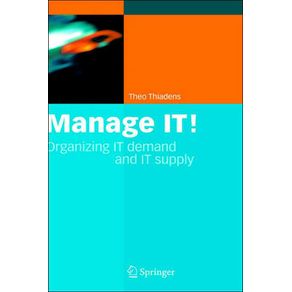In the network economy almost every organization depends on perfect IT facilities. Every organization is forced to reflect on its IT demand. Realizing the organization of supply and demand is the subject of this book. The book consists of five parts. In the first part, IT management tasks and the objects involved are discussed. The execution of these tasks has to meet with functional and performance demands. These requirements are more easily met when an organization has a transparent IT architecture at its disposal. The second part outlines traditional IT management. The starting point is a process-oriented functioning of the IT organization. This goes for both the IT demand organization as well as the IT supply organization. In this part, methods like BISML, ASL, ITIL, MOF, MSF, TMN and eTOM are discussed. The third part deals with controlling IT. The aim of this control is diverse. Control is different when striving for efficiency and complying with accountant’s requirements, compared to the control as used when IT is a means to comply with customer’s and/or chain partners’ wishes. In the latter case, innovation of IT processes is an issue. Part four tackles aspects of IT management. Amongst other things, the financial, personnel, purchasing, legal and security aspect in IT are discussed. Besides this, attention is paid to entering service agreements and achieving standardization. The book ends with a look into the future. The effects of striving for "utility computing" and better control of IT by means of "IT portfolio management" are explained. The book is supported by the website www.ict-management.com. On this site every chapter can be found in the form of a presentation. Lecturers using the book have access to suggestions with solutions for all of the 17 smaller and 8 larger cases included in the book.



